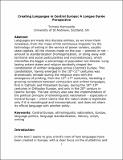Files in this item
Creating languages in Central Europe: a longue durée perspective
Item metadata
| dc.contributor.author | Kamusella, Tomasz Dominik | |
| dc.contributor.editor | Hara, Kiyoshi | |
| dc.contributor.editor | Heinrich, Patrick | |
| dc.date.accessioned | 2016-09-06T11:30:15Z | |
| dc.date.available | 2016-09-06T11:30:15Z | |
| dc.date.issued | 2016 | |
| dc.identifier.citation | Kamusella , T D 2016 , Creating languages in Central Europe: a longue durée perspective . in K Hara & P Heinrich (eds) , Standard Norms in Written Languages : Historical and Comparative Studies Between East and West . Joshibi University of Art and Design , Tokyo , pp. 141-237 . | en |
| dc.identifier.isbn | NA | |
| dc.identifier.other | PURE: 244566801 | |
| dc.identifier.other | PURE UUID: dac38850-5218-44b8-9c88-c9e9ce9d2e5d | |
| dc.identifier.other | ORCID: /0000-0003-3484-8352/work/42102741 | |
| dc.identifier.uri | https://hdl.handle.net/10023/9440 | |
| dc.description.abstract | Languages are made into discrete entities, as we know them nowadays, from the ‘mass of the continuous linguistic’ by the technology of writing in the service of power centers, usually state capitals. All the choices made on the way – planned or not – amount to standardization (homogenization, or doing away with territorial and social particularities and inconsistences), which intensifies the bigger a percentage of population are literate. Long lasting extant states and religion decidedly shaped the constellation of written languages across (Central) Europe. This constellation, having emerged in the 10th-11th centuries was dramatically remade during the religious wars with the emergence of printing, from the 15th-17th centuries, heralding a growing correlation between vernaculars and written languages, first in Catholic and Protestant Europe, during the 18th-19th centuries in Orthodox Europe, and only in the 20th century in Islamic Europe. The last century also saw the implementation of the political principle of ethnolinguistic nationalism – especially in Central Europe – which claims that the nation-state is legitimate only if it is monolingual and monoscriptural, and does not share its official language with another polity. | |
| dc.language.iso | eng | |
| dc.publisher | Joshibi University of Art and Design | |
| dc.relation.ispartof | Standard Norms in Written Languages | en |
| dc.rights | © 2016, the Author. This work is made available online in accordance with the publisher’s policies. This is the author created, accepted version manuscript following peer review and may differ slightly from the final published version. | en |
| dc.subject | Central Europe | en |
| dc.subject | Language creation | en |
| dc.subject | Language standardiztaion | en |
| dc.subject | Language politics | en |
| dc.subject | Script politics | en |
| dc.subject | Ethnolinguistic nationalism | en |
| dc.subject | Europe | en |
| dc.subject | Literacy | en |
| dc.subject | Script | en |
| dc.subject | Writing | en |
| dc.title | Creating languages in Central Europe: a longue durée perspective | en |
| dc.type | Book item | en |
| dc.description.version | https://doi.org/Postprint | en |
| dc.contributor.institution | University of St Andrews. School of History | en |
This item appears in the following Collection(s)
Items in the St Andrews Research Repository are protected by copyright, with all rights reserved, unless otherwise indicated.

